Key takeaways:
- Understanding MATLAB’s basics, including variables, data types, and functions, is crucial for effective programming and problem-solving.
- Hands-on practice through mini-projects and utilizing MATLAB’s documentation enhances learning retention and mastery of concepts.
- Community engagement and collaboration significantly enrich the learning process, providing support and alternative problem-solving perspectives.
- Embracing best practices like writing clear comments, leveraging vectorization, and organizing code into functions drastically improves coding efficiency and maintainability.

Understanding MATLAB basics
MATLAB, or Matrix Laboratory, is a high-level programming environment that excels in numerical computing and data visualization. When I first began my journey with MATLAB, I was amazed at how intuitive it felt, especially when working with matrices and arrays. Have you ever encountered a tool that just clicked for you? That’s exactly how I felt as I started to grasp its potential for tackling complex mathematical problems with ease.
One of the first things I learned was the importance of understanding variables and data types in MATLAB. It’s like learning the foundation of a house—without a solid base, the rest can crumble. For example, I remember struggling with the difference between scalars, vectors, and matrices. Once I had that down, everything else started to make sense, and I could really harness MATLAB’s capabilities to perform operations efficiently.
As I dived deeper, I discovered the power of functions. They allow you to perform repetitive tasks without cluttering your main script. Have you ever been stuck rewriting the same code over and over? I certainly have! Once I mastered creating functions, I found my workflow significantly improved. It made coding feel less like a chore and more like a seamless interaction with the software, enhancing my overall experience with MATLAB.
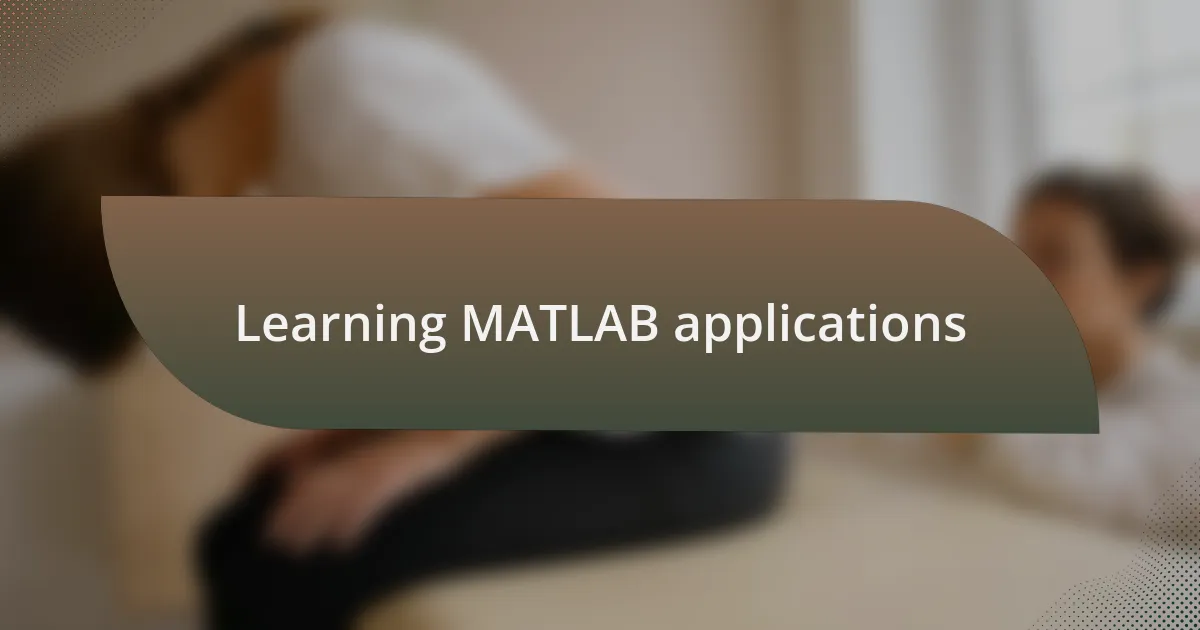
Learning MATLAB applications
Learning MATLAB applications opens up a world of possibilities. I vividly recall my first real project where I used MATLAB for data analysis. The moment I imported a dataset and began visualizing it, I felt a rush of excitement—transforming raw data into meaningful insights was incredibly fulfilling. Have you ever had that moment where you realize the potential of a tool? It’s empowering.
As I explored further, I became fascinated with MATLAB’s capabilities in simulation and modeling. There was a project where I had to create a mathematical model to predict outcomes based on various inputs. The thrill of seeing my code come to life in a simulated environment was unmatched. I often ask myself, how would I approach this problem without MATLAB? It’s hard to imagine going back to tedious manual calculations when I know how much efficiency the software brings.
One of the most rewarding aspects of my learning journey in MATLAB has been the community and resources available. I remember seeking help on forums for a particularly perplexing issue I encountered. The support I received from experienced users not only solved my problem but also enhanced my understanding of MATLAB’s extensive applications in fields like machine learning and image processing. Have you ever realized that learning can be a shared experience? That sense of camaraderie truly enriched my learning process.
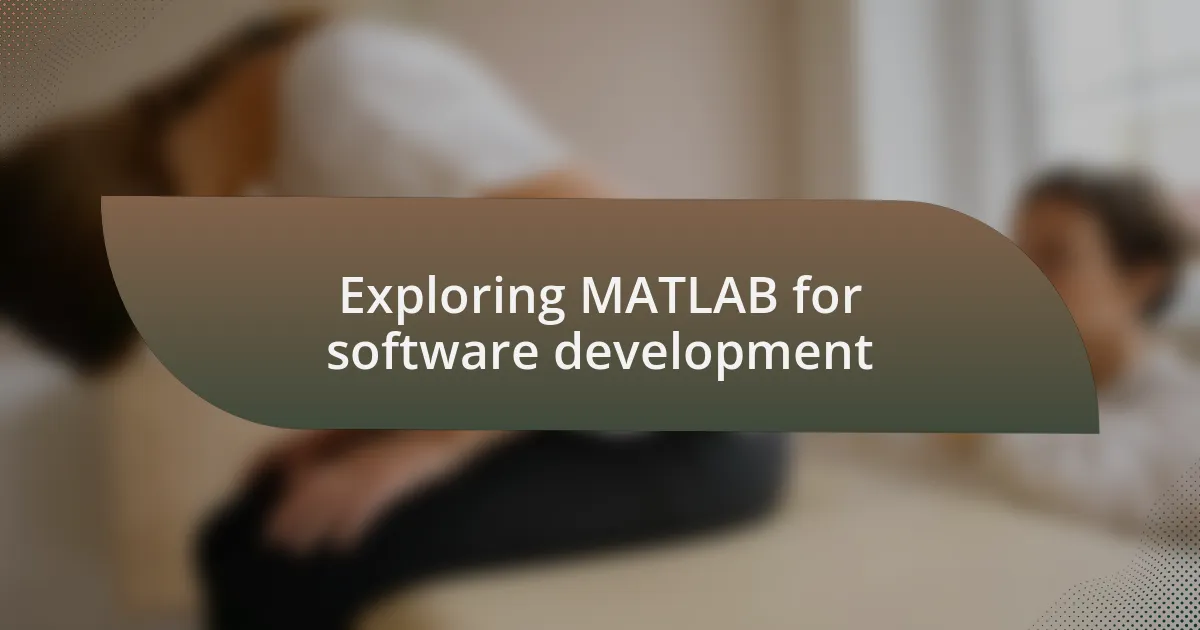
Exploring MATLAB for software development
Exploring MATLAB for software development reveals its versatility. When I first delved into algorithm development, I was astounded by how MATLAB’s built-in functions simplified complex tasks. With just a few lines of code, I could implement algorithms that would have taken me hours manually. Have you ever experienced that lightbulb moment when you realize you can streamline your workflow?
One of my favorite features is MATLAB’s ability to integrate with other programming languages. I recall a time when I needed to embed MATLAB code within a larger C++ application. The process felt remarkably seamless, bridging the gap between these two languages. It made me appreciate the collaboration between different programming environments. Isn’t it fascinating how one tool can enhance another’s capabilities?
As I continued my exploration, I discovered MATLAB’s robust testing framework. Running tests with MATLAB’s unit testing tools not only improved my code quality but also gave me confidence in my software’s reliability. I still remember successfully debugging a particularly stubborn issue while utilizing these tools. It made me question how I ever managed without such a structured approach to testing before. Wouldn’t it be great if every software development tool offered such comprehensive support?
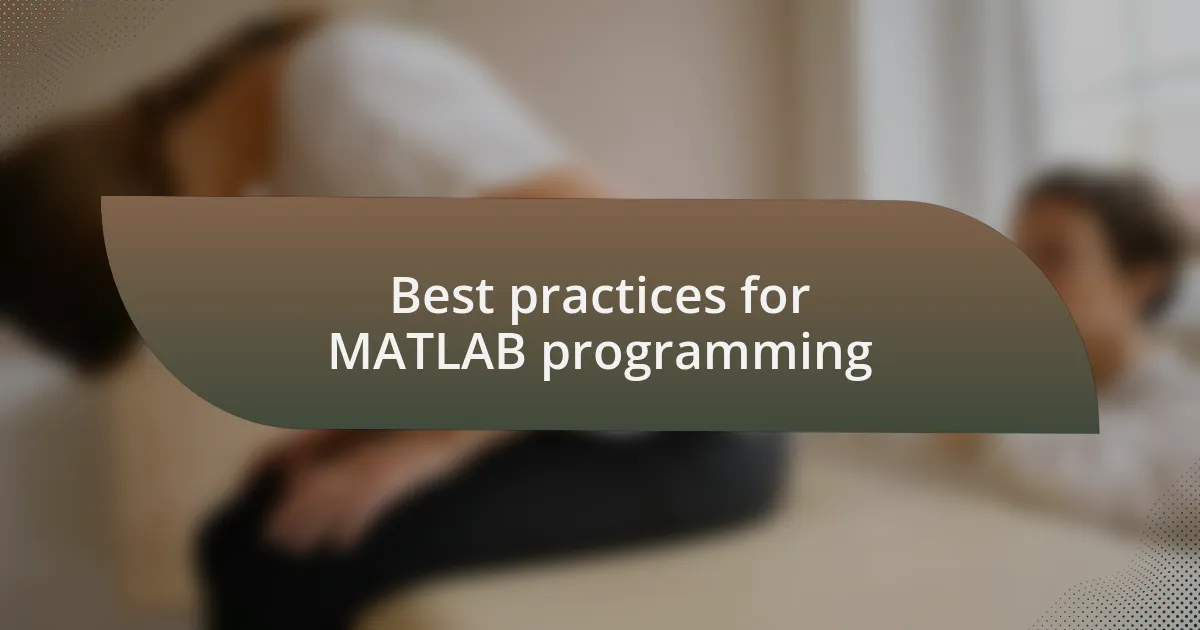
Best practices for MATLAB programming
One of the best practices I’ve embraced in MATLAB programming is writing clear, descriptive comments within my code. Initially, I underestimated their importance, thinking I could simply remember what I had written. However, there was a moment when I returned to a project after a few months and struggled to recall the logic behind my functions. That experience made me realize how valuable comments are for maintaining clarity, not just for others but also for my future self. Have you ever been in a similar situation, faced with confusion over your own code?
Another essential practice is to leverage MATLAB’s vectorization capabilities. Early on, I tended to write loops to process arrays, thinking it was the most straightforward approach. But when I discovered how vectorization could significantly improve performance, it felt like unlocking a hidden potential within MATLAB. My code became not only faster but also cleaner and easier to read. Who wouldn’t want to enhance their code efficiency while maintaining simplicity?
Lastly, organizing code into functions rather than cramming everything into scripts has changed the way I approach programming in MATLAB. At first, I would create long scripts that became unwieldy and difficult to debug. Once I started modularizing my code, I found that each function had a clear purpose, making it much easier to test and update. This practice not only improved my workflow but also reduced stress when working on complex projects. Have you experienced the relief that comes from a well-structured piece of code?

My personal journey with MATLAB
When I first dived into MATLAB, I remember feeling overwhelmed by its vast capabilities. I took a course that introduced me to its basics, but it wasn’t until I started working on a personal project that things clicked. I vividly recall the thrill of seeing my first plot emerge from those lines of code. It felt like magic, yet also like a puzzle I was slowly piecing together. Have you ever experienced that euphoric moment when your code finally works as intended?
As I continued my journey, I stumbled upon MATLAB’s extensive documentation and user community. This resource was a lifeline for me, especially when I hit roadblocks. There were nights when I guiltily sat in front of my laptop, sifting through forums and manuals, feeling both frustration and determination. Those moments taught me that learning is not just about code—it’s also about problem-solving and resilience. Have you found technical communities to be supportive on your path to mastering a new skill?
Reflecting on my experiences, the most rewarding aspect has been the growth I’ve witnessed in my problem-solving abilities. Each project challenged me to think creatively and approach problems from different angles. I recall a particularly daunting task involving data visualization that pushed me out of my comfort zone. As I conquered each obstacle, I not only refined my technical skills but also built a new confidence in my ability to tackle complex challenges. Isn’t it fascinating how learning a programming language can transform your mindset and approach to problem-solving?
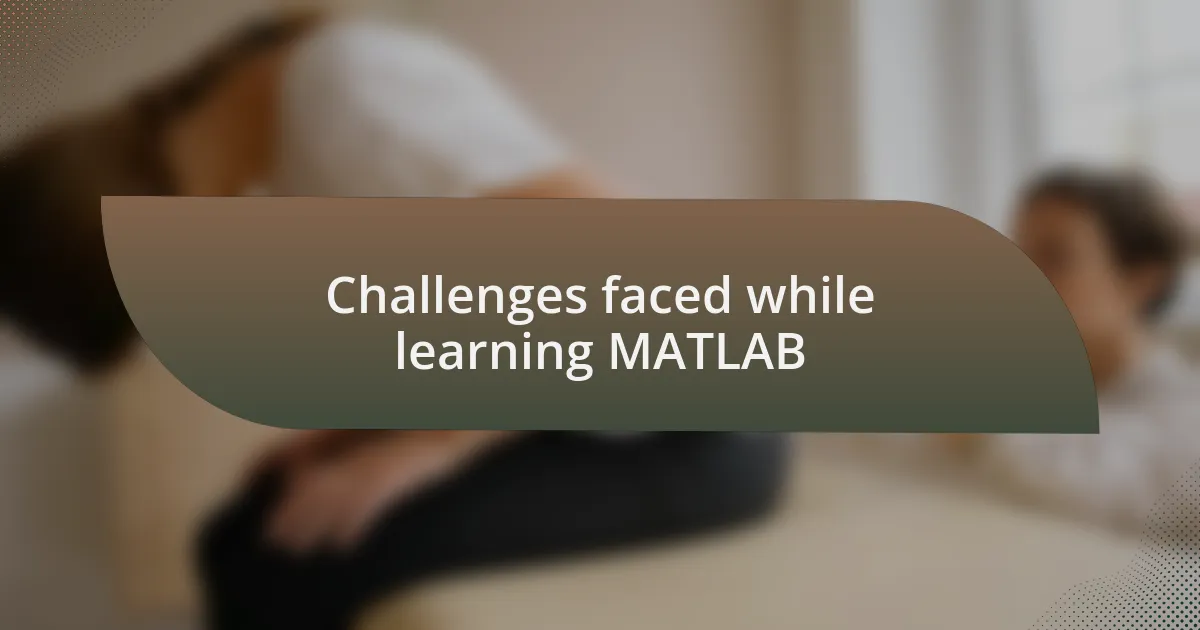
Challenges faced while learning MATLAB
One of the biggest challenges I faced while learning MATLAB was grappling with its syntax and structure. Coming from a background in other programming languages, I often found myself frustrated by the differences—not just in commands, but in the logic behind them. Have you ever spent hours debugging only to discover a misplaced parenthesis? That moment of realization can be both disheartening and a lesson in attention to detail.
I distinctly remember a specific project where I was tasked with implementing algorithms for data analysis. The learning curve was steep; concepts like matrix manipulations and function handles felt like a foreign language at first. I often felt lost, but each time I encountered a challenge, I pushed myself to research and experiment. Isn’t it empowering, though, to emerge victorious after a period of struggle?
Additionally, I found that working with MATLAB’s graphical user interface was another layer of complexity that I needed to tackle. Initially, I assumed that it would be straightforward, but I quickly learned that achieving the desired visualizations required a deeper understanding of both data structures and plotting functions. Can you relate to the frustration of trying to create that perfect plot, only to realize you needed to revisit your data preparation? Each misstep taught me patience and the importance of a systematic approach to learning.
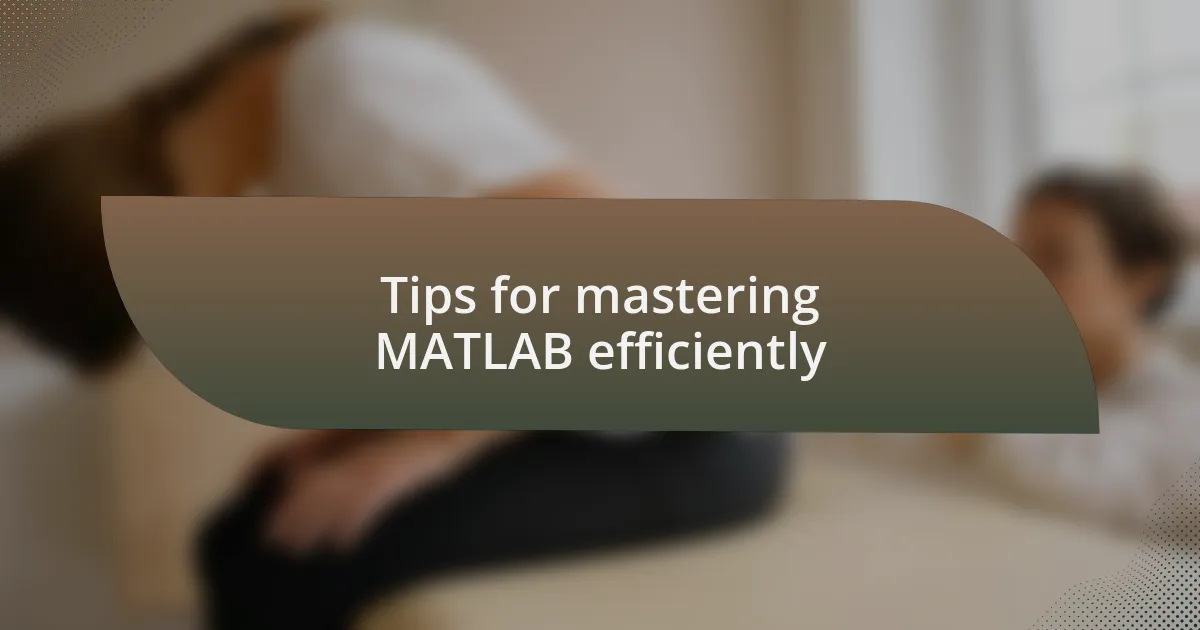
Tips for mastering MATLAB efficiently
When I decided to tackle MATLAB, I quickly realized the importance of hands-on practice. I set aside time each week to work on mini-projects, which helped me solidify my understanding of concepts like loops and conditionals. Have you ever noticed how much more you retain when you apply what you’ve learned in a practical setting? That moment of integration is where true mastery can blossom.
One tip that transformed my learning was utilizing MATLAB’s extensive documentation and built-in help features. At first, I often overlooked these resources, thinking I could figure everything out on my own. But once I began to explore the documentation, I discovered example code snippets that illuminated complex concepts. It was like finding a hidden treasure trove of knowledge. Have you ever tried to run a function only to discover you weren’t using the right syntax? Diving into the user guides can save you from such pitfalls.
Collaboration also played a huge role in my MATLAB journey. I found engaging with online forums and study groups invaluable. Sharing obstacles with others not only provided insights into different problem-solving techniques, but it also created a supportive community. There were times when discussing challenges with others reignited my motivation, reminding me that I wasn’t alone in navigating this intricate tool. Have you ever felt empowered by simply sharing your experience with someone else? That communal learning can be a significant catalyst for growth.